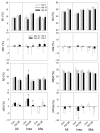Effects of Lactobacillus plantarum PS128 on Depressive Symptoms and Sleep Quality in Self-Reported Insomniacs: A Randomized, Double-Blind, Placebo-Controlled Pilot Trial
- PMID: 34444980
- PMCID: PMC8402034
- DOI: 10.3390/nu13082820
Effects of Lactobacillus plantarum PS128 on Depressive Symptoms and Sleep Quality in Self-Reported Insomniacs: A Randomized, Double-Blind, Placebo-Controlled Pilot Trial
Abstract
Recent animal studies have supported that Lactobacillus plantarum PS128 (PS128) can reduce the severity of anxiety and depression. However, previous studies did not focus on the sleep quality and mood of humans. This study determines whether PS128 reduces the severity of anxiety and depressive symptoms, regulates autonomic nervous system function, and improves sleep quality. Forty participants between 20 and 40 years of age with self-reported insomnia were randomly assigned to two groups, a PS128 group and a placebo group, in a double-blind trial. Participants took two capsules of either PS128 or a placebo after dinner for 30 days. Study measures included subjective depressive symptoms, anxiety and sleep questionnaires, and miniature-polysomnography recordings at baseline and on the 15th and 30th days of taking capsules. Overall, all outcomes were comparable between the two groups at baseline and within the 30-day period, yet some differences were still found. Compared to the control group, the PS128 group showed significant decreases in Beck Depression Inventory-II scores, fatigue levels, brainwave activity, and awakenings during the deep sleep stage. Their improved depressive symptoms were related to changes in brain waves and sleep maintenance. These findings suggest that daily administration of PS128 may lead to a decrease in depressive symptoms, fatigue level, cortical excitation, and an improvement in sleep quality during the deep sleep stage. Daily consumption of PS128 as a dietary supplement may improve the depressive symptoms and sleep quality of insomniacs, although further investigation is warranted.
Keywords: Lactobacillus plantarum PS128; anxiety; depression; heart rate variability; insomnia.
Conflict of interest statement
Y.-C.T. owns stock in Bened Biomedical Co., Ltd. Other authors declare no conflict of interest. The funder had no role in the design of the study; in the collection, analysis, or interpretation of data; in the writing of the manuscript; or in the decision to publish the results.
Figures






References
-
- Sampson T.R., Debelius J.W., Thron T., Janssen S., Shastri G.G., Ilhan Z.E., Challis C., Schretter C.E., Rocha S., Gradinaru V., et al. Gut Microbiota Regulate Motor Deficits and Neuroinflammation in a Model of Parkinson’s Disease. Cell. 2016;167:1469–1480. doi: 10.1016/j.cell.2016.11.018. - DOI - PMC - PubMed
-
- Łuc M., Misiak B., Pawłowski M., Stańczykiewicz B., Zabłocka A., Szcześniak D., Pałęga A., Rymaszewska J. Gut microbiota in dementia. Critical review of novel findings and their potential application. Prog. Neuro-Psychopharmacol. Biol. Psychiatry. 2021;104:110039. doi: 10.1016/j.pnpbp.2020.110039. - DOI - PubMed
Publication types
MeSH terms
Grants and funding
LinkOut - more resources
Full Text Sources
Other Literature Sources
Medical

